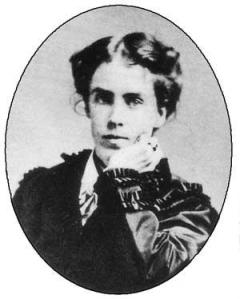On February 1, 1870, twenty-eight year old William James– a brilliant, charismatic young man possessed of tremendous (if diffuse) creative energies and an evident aptitude for the arts and sciences alike, but who nonetheless felt guilty and adrift in life because (or so he imagined) he could not commit himself to a definite vocational path– recorded this entry in his personal diary:
 “Today I about touched bottom, and perceive plainly that I must face the choice with open eyes: shall I frankly throw the moral business overboard… or shall I follow it, and it alone, making everything else merely stuff for it?”
“Today I about touched bottom, and perceive plainly that I must face the choice with open eyes: shall I frankly throw the moral business overboard… or shall I follow it, and it alone, making everything else merely stuff for it?”
“The moral business” for James meant the possibility of genuine personal volition and free choice, expressed in the form of a definite life-plan which he could embrace as his own freely chosen path. He had come to doubt himself so severely, after abandoning earlier careers plans centering on art, medicine, and scientific field exploration, that he was now wholly without confidence in the efficacy of his own will. He questioned his ability to identify any preference compelling enough to awaken even a modest passion, and was now on the verge of wondering whether life would even be worth living.
So his choice was very stark: act as if his will was free, and sufficient to motivate real action; or give it up, and surrender to apathy and drift. Existential shipwreck loomed.
“Stuff” for the moral business would be the hard challenge of staying the course and sticking with a plan, through thick and thin. Was he ready to face and fight adversity, and persevere to accomplish important goals? He frankly didn’t know.
The James who would later declare his implacable hostility to evil, and his zest for the fight, had not yet materialized into clear view, in 1870. The young man had indeed arrived at a crisis-point in his life (and this is now widely recognized by James scholars as a “crisis text” in his biography).
One of the precipitants of this crisis was the death of a dear friend, possibly a romantic interest, and (btw) his first cousin, Minnie Temple,* at age 23.
Minnie Temple,* at age 23.
 Minnie Temple,* at age 23.
Minnie Temple,* at age 23.
Minnie and Willy “were in some ways similar spirits, restless, yearning, hungry for life, ambitious, scornful of second best, sensitive, ironic, and outgoing… Minnie Temple was the first woman William had ever been able to accept as a complete equal, and the first person he could talk with about his deepest religious and spiritual concerns.”
But William’s depression blocked the union of souls and merger of lives they might have pursued, cousin-hood notwithstanding. “Nature and life have unfitted me for any affectionate relations with other individuals.” Yet at this time, incidentally, he was preparing an ambitious reading list that included Schopenhauer: probably not the best choice, at this low ebb in his life.
James received a letter from Minnie in February declaring: “the question will always remain, what is one’s true life,– and we must each try and solve it for ourselves.” Less than a month later, Minnie passed away.
James wrote to her, posthumously. “By that big part of me that’s in the tomb with you, may I realize and believe in the immediacy of death. Minnie, your death makes me feel the nothingness of all our egotistical fury… Use your death (or your life, it’s all one meaning) tat tvam asi (lit., that you are).
And so young Willy took another giant step towards becoming himself, the pragmatist philosopher William James. “The closing days of Minnie Temple’s life mark the first time in James’s life that he was able to accept the active religious struggle of another person as a valid religious experience… his first glimpse of a view of life as larger than our individual lives.”
====
* Minnie Temple was the real-life prototype for Henry James‘s most interesting American girls, for Daisy Miller, Isabel Archer, and Milly Theale, and it was this provocative and irresistible Minnie – charged to the lips with life – who broke in upon William James’s turbulent, unfixed, unsatisfied existence when he returned home from Germany. “Everyone was supposed, I believe, to be more or less in love with her… but it was William that Minnie had her eye on, and it was William who was in love with her….”
No comments:
Post a Comment